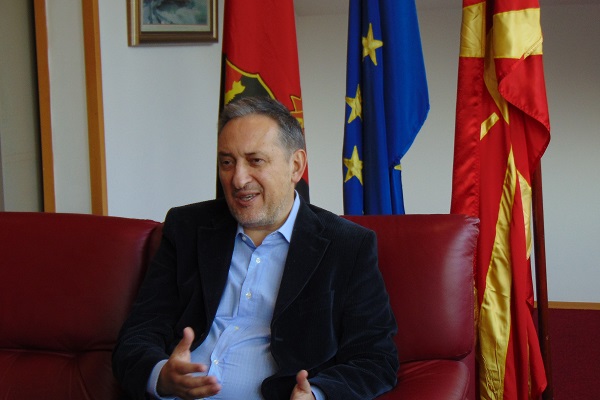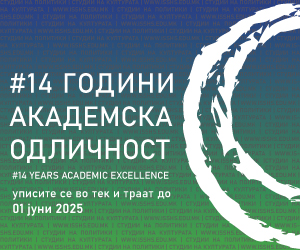by: Ljubco Georgievski
[dropcap font=”arial” fontsize=”45″]T[/dropcap]he Macedonian identity, in my opinion, is not endangered by the determinant “Northern” or “Upper” before the name of the country, but by the attitude of the ethnic Macedonians towards their own identity. Macedonians even under the Ottoman rule succeeded to save their identity by preserving their culture and tradition… They danced Macedonian folk dances, sang songs in Macedonian and spoke in Macedonian language…Let’s take a look at how much we ourselves nowadays in Macedonia care about our own Macedonian identity.
The topic of the identity is an issue that is dear to me and I have spoken about it to the public many times and in many addresses. Perhaps this is a good moment for me to repeat some of those views of mine, which I hope will have some influence in overcoming this situation that we can call a crisis.
When we talk about the identity, especially the Macedonian identity, and about the main issue – whether there will still be a Macedonian identity, we have to reflect a little on the history of the issues of the Macedonian identity and its changing, let’s say for the period of the last hundred years. The reason is precisely the fact that, unfortunately, in the last decade we are talking about the Macedonian identity in the period of several thousands of years ago, something to which I was very critical, and finally, I am pleased that as a propaganda idea it is not succeeding today.
So, will the Macedonian identity survive and will the Macedonian identity withstand following the agreement in Prespa? I am absolutely optimistic, but we have to approach the problem objectively.
In the last ten years in Macedonia, one of the most radical changes happened in the identity of the people in Europe, and even in the world, which we, as witnesses in modern history, can see. All of a sudden, from everything we know, and it was quite an established norm – that the Macedonian people are part of the Slavic group of people, we suddenly turned into ancient Macedonians! Into something special, something exclusive, into something that has nothing to do with anything in the world, and we made a story out of that, which unfortunately many started to believe. And those who were the carriers of that idea, I think abused it out of purely marketing reasons for winning elections.
More specifically, it is about the so-called ancient identity of the Macedonian people, for which I have many texts, we are not ancient Macedonians, we should not draw our source from there, and I hope that today, in a more normal discussion, we will manage to deny this thesis in a more argued manner. Otherwise, when we talk about that false identity, I must say that it caused us much harm in the political relations with our neighbours, it caused us damage in the relations with the international community, though, it caused the greatest damage to us.
At the psychological level, we rose above all the others, and started to imagine that we are the center of the world, that everything revolves around us, that they can’t do anything without us, and this actually is not the case, the world does go on without us being present in it…And without any special discussion, without the quasi- scientists who were writing books and filming documentaries on that topic. All of that actually was quasi- science that simply bombarded us and caused permanent damage, which I believe will last for many years after these events.
The projection of the propaganda in these past 11 years spoke about some kind of identity of a Macedonian nation and an identity that we understand today, at least two or three thousand year back, and the period of 50 or 100 years is being skipped…it is very problematic and it really creates a problem in the consciousness of a Macedonian, when we project today’s consciousness of ours about the Macedonian identity 2000 years back. When we take a look at the facts, things are quite different. Let’s take Macedonia before the Ilinden uprising in 1903, and see what happened with that Macedonian identity. If we make an outline of the Macedonian identity then, that is, of the Slavic population, two-three years before the Ilinden uprising, we will see an odd picture, for which we need to openly talk about and face. We will see that the vast mass of Macedonian Slavs living on the territory of the ethnic Macedonia declare themselves as everything else, but as Macedonians. There is a huge mass of Macedonians who have become Muslims and declare themselves as Turks, and we deal scientifically with that part of the Macedonian population very little, who first Islamized themselves and later took the name Turks. That is part of the Macedonian ethnic story.
Furthermore, we go to a layer of so-called Greek patriarchs, who are not to be underestimated, who at that time accounted for about 300-400 thousand Macedonians, who declared themselves as Greeks. Many of those who fought against the Macedonians, such as Greek patriarchs, were exactly Macedonians and we have such famous names.
The third group are Macedonians who under the influence of foreign propaganda and the Serbian Patriarchate declared themselves as Serbs, we have such enclaves in Struga, Porece, Skopska Crna Gora, Kumanovo… They too are Macedonians, but feel as and declare themselves as Serbs.
And finally, the greatest mass, which we want to admit very shyly, declare themselves as Macedonian Bulgarians. Practically, if we take a look at that VMRO revolutionary idea, if we want to be objective, we will see that, unfortunately, that historic VMRO, even in its documents at the start relied only on the Macedonians who declared themselves Bulgarians. And that is why in 1902 we have Krste Petkov Misirkov’s book “On Macedonian Matters”, in which he clearly and unequivocally says – what if there has not been a Macedonian nation until yesterday? His idea is precisely that, for all the Slavs in Macedonia, who at that moment declared themselves as Serbs, Greeks, Bulgarians or Turks, to call themselves Macedonians. That is the basis of the Macedonian ethnic story, of the national identity that we simply want to skip, whether politically or because we cannot face reality…
Anyone who had requested a millet during the Ottoman Empire, under “anyone” I refer to what was called ethnic community or entity in former Yugoslavia, received it. Misirkov himself says in that book: “I am sure that if tomorrow we were to ask for a Macedonian millet from the Ottoman Empire, the Turks would give it to us”. However, that does not happen! VMRO, the Macedonian intelligence from that time, do not demand a Macedonian millet, there is no such thing in our history, there is no such letter, there is no such manifest…in 1905, 100 Vlach traders and intellectuals gather, send a letter to the Sultan and the Sultan gives them a Vlach millet. That is not the case with the Macedonian people.
The Macedonian identity, in my opinion, is not endangered by the determinant “Northern” or “Upper” before the name of the country, but from the attitude of the ethnic Macedonians towards their own identity. The Macedonians under the Ottoman slavery succeeded to save their identity by preserving their culture and tradition.
They danced Macedonian folk dances, sang songs in Macedonian and spoke in Macedonian language…Let’s take a look at how much we ourselves in Macedonia care about our own Macedonian identity. To go to a Macedonian wedding, Macedonian celebration, I guarantee you that the Macedonian contemporary nation and the Macedonian contemporary state are the only ones on the Balkans, where their own national song is minor compared to the cultural influences! We are not doing anything, we talk about the Macedonian identity, and when we celebrate at a wedding, birthday, we do not sing a Macedonian song, and then we say that someone else is endangering the Macedonian identity. No, we ourselves are endangering it.
For hundreds and hundreds of Macedonians, in the diaspora, when I used to go there when we were supposed to create the Macedonian state, the main question they asked me was – why should they pay 50 dollars for a Macedonian passport? Those are the people who are talking about Macedonia, who found it difficult to pay, and I think that even today that problem is present in many discussions of the Macedonian diaspora, when they are supposed to pay 50 euros or 50 dollars to get a Macedonian passport…
Let’s continue, many of them should ask themselves why have they not returned to Macedonia for 15 years. They come to Macedonia when their father or mother dies and they need to bury them, and again, they will not come back in the next 15 years. What about not naming the children in the diaspora with Macedonian names? Finally, what about not learning in the Macedonian language? I guarantee you that at this moment, 50 percent of the children of the first generation of Macedonians who are in the diaspora do not know Macedonian, and not to mention the second generation…99 percent do not know Macedonian!
And finally, indeed about the arguments that the addition like – Northern, is damaging. There is no damage and there is no repercussion for the defence of the Macedonian identity and for the question – will there be a Macedonian identity. Simply, in my opinion, this is a not a question for discussion. I have spoken about this many times, I have said many times that the identity issue is something that we ourselves need to defend, and to carry it ourselves.
Not to talk about the examples with the names I have mentioned so very often. The example of neighboring Kosovo, the people are Albanian, partly Serbian, but let’s look at the Albanian as the carrier, they do not think for a moment that the name Kosovo is a problem for their identity. I would also like to remind of our northern neighbor, Serbia, when all the republics fell apart and it was only them who remained Yugoslavia, I think the name was Yugoslavia for 6-7 months, the people were Serbian, and there was also a discussion for them to keep the name Yugoslavia.
The identity is something much more original, it is a feeling that no one can endanger if you have your own state. I too regret that the identity issue that in principle is a minor issue has become a problem for the Macedonians in Macedonia. Let’s say in Turkey – the Kurds are fighting for rescuing or protecting their own identity, in Macedonia the question can be raised by all minorities –just not, the Macedonian people – is their identity protected, does the state care for that identity, is there a policy of assimilation…, these are the identity issues.
This issue puts us in a deep hole from which we cannot come out of. And we have been going around this question for 30 years. I see, there are still many political forces who are trying to keep this issue alive, again with the same topics and with the same stories…While basically, it is just one negation of one’s own identity.
The article is part of the project “Identity Loss or …?” implemented by CIVIL in cooperation with the Heirich Böll Foundation.
This post is also available in: MacedonianAlbanian





